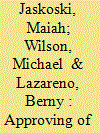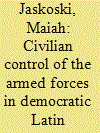| Srl | Item |
| 1 |
ID:
172178


|
|
|
|
|
| Summary/Abstract |
Why do some political radicals—people who believe in using violence for political ends and who may sympathize with local violent groups—not themselves perform violent acts or join violent organizations? This article finds that prior research on terrorism, insurgency, civil war, and ethnic conflict seems to do a poor job of predicting who upon adopting radical political views will actually engage in violence. In fact, there is a great deal of contingency involved in the choice of whether or not to become violent. Employing path dependence, the article treats the radicalizing moment as a “critical juncture,” filled with contingency, but after which actions become more predictable: during this small window of time, radicalized individuals might happen to choose a profession and/or join an organization that is nonviolent, but subsequently become institutionalized as nonviolent actors. The article therefore offers an explanation for how individuals with radical beliefs can be institutionalized as either violent or nonviolent. The study’s findings are based on a content analysis of interviews with 129 nonviolent activists, most of whom exhibited radical beliefs at the time of the interview, and former violent actors, in 12 countries experiencing violent internal conflict.
|
|
|
|
|
|
|
|
|
|
|
|
|
|
|
|
| 2 |
ID:
109946


|
|
|
|
|
| Publication |
2012.
|
| Summary/Abstract |
This article presents a new framework for measuring civilian control of the armed forces in post-transition Latin America. Specifically, it builds on approaches that focus on military privileges and military protest, particularly in the face of government challenges to those privileges. Adding mission performance as a third dimension both helps us measure civilian control more accurately and provides causal leverage, as the three dimensions can interact. The paper demonstrates the utility of the framework through a close-up analysis of a critical case: civil-military relations in Peru since the 1990s.
|
|
|
|
|
|
|
|
|
|
|
|
|
|
|
|